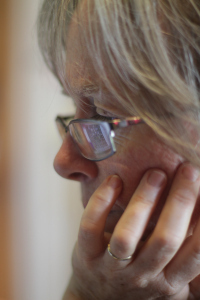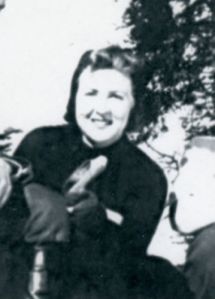Phyllis Edgerly Ring's Blog, page 13
October 14, 2016
Keeping the wide-open way
GLEANINGS FOUND HERE AND THERE:
 If you love yourself, you love others. If you hate yourself, you hate others. Because in relationship with others … the other is nothing but a mirror.
If you love yourself, you love others. If you hate yourself, you hate others. Because in relationship with others … the other is nothing but a mirror.
~ Osho
 One of the first things Seneca children learned was that they might create their own world, their own environment, by visualizing actions and desires in prayer. The Senecas believed that everything that made life important came from within.
One of the first things Seneca children learned was that they might create their own world, their own environment, by visualizing actions and desires in prayer. The Senecas believed that everything that made life important came from within.
~ Twylah Nitsch
In the morning when you wake up, reflect on the day ahead and aspire to use it to keep a wide-open heart and mind.
When, however, thou dost contemplate the innermost essence of all things, and the individuality of each, thou wilt behold the signs of thy Lord’s mercy in every created thing, and see the spreading rays of His Names and Attributes throughout all the realm of being …
not an atom of all the atoms in existence, not a creature from amongst the creatures but speaketh His praise and telleth of His attributes and names, revealeth the glory of His might and guideth to His oneness and His mercy …
~ ‘Abdu’l-Bahá


October 12, 2016
The past may not be done with us
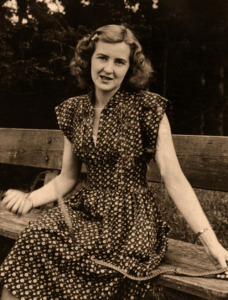 The Munich Girl: A Novel of the Legacies that Outlast War –
The Munich Girl: A Novel of the Legacies that Outlast War –
https://www.amazon.com/Munich-Girl-Novel-Legacies-Outlast-ebook/dp/B01AC4FHI8/
Extra grateful for one Amazon reviewing reader’s insightful thoughts::
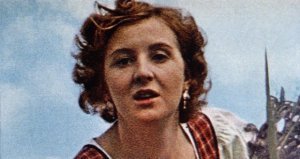 “In The Munich Girl, Phyllis Edgerly Ring takes on two difficult challenges.
“In The Munich Girl, Phyllis Edgerly Ring takes on two difficult challenges.
“First she tells the story of a woman, Eva Braun, many of us would rather not know about.
Ring tells that story with empathy so contagious we can’t help but be drawn in.
“Second she tells her story through the triple prism of three different women and their separate experiences. As we grow to know each woman our compassion grows as well and we become more and more emotionally involved. 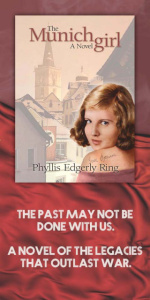
“Another challenge deftly navigated is the time frame of the three stories from the present to before and during WWII then back again.
“Ring manages these shifts without disrupting the forward momentum of the story. … ”
Find the rest, and more about the book at:
https://www.amazon.com/review/R1KKGJPGYPLY8U/ref=cm_cr_rdp_perm?ie=UTF8&ASIN=B01AC4FHI8


October 7, 2016
“Things were almost always more complex than they appeared.”
Publishing a book is a gateway to the unexpected in countless ways, as well as a nonstop curve of learning and discovery.
One delightful part of the experience is encountering the connection that readers make with a book, its world, and its story.
In her review at Goodreads, reader Mary Spires called The Munich Girl “a story of love, power and the meaning of family.” 
She wrote:
“Readers see 1930s and ’40s Germany through the eyes of young women growing into adulthood. In the midst of increasing chaos, they fall in love, develop allegiances and make sacrifices. While family secrets unfold to the next generation, we see how their support for one another has allowed each to play out her role in a period of transition. These themes cross barriers of time, nationality and political persuasion.”
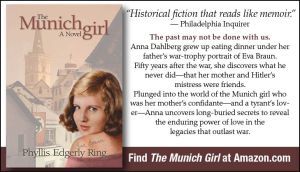 “As a lover of historical fiction, I have read from a variety of different perspectives of World War II,” writes reviewer Melissa Lee. “However this was the first time I had read about German citizens who lived ‘freely’ in the presence of the Third Reich. I use the word ‘freely’ loosely, as regular German citizens were far from free during Hitler’s reign. …
“As a lover of historical fiction, I have read from a variety of different perspectives of World War II,” writes reviewer Melissa Lee. “However this was the first time I had read about German citizens who lived ‘freely’ in the presence of the Third Reich. I use the word ‘freely’ loosely, as regular German citizens were far from free during Hitler’s reign. …
“I was pleased that this book wasn’t centered around, or bogged down with the politics of World War II. Instead it was more of a tale about friendship, sacrifices and legacies.” 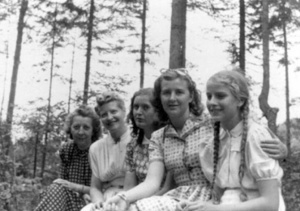
“Reading The Munich Girl was like taking a journey to another place and another time,” writes Cynthia Minor. “It is difficult to know where the ‘real’ ends and the ‘possible’ begins.The story weaves itself across continents and decades, and is a beautiful image of the way our lives are not only connected to those we know and share life with, but with those in our past, whom we may or may not even be aware of.
‘One could look at another’s life and judge or envy what it seemed to show. But things were almost always more complex than they appeared.’
This was and is still true, of everyone we meet.”
Find the Goodreads page for The Munich Girl here:
https://www.goodreads.com/book/show/27914910-the-munich-girl#other_reviews


October 2, 2016
Life in the shadows
As I receive feedback from book-discussion groups and readers, I reflect on how much the world’s continuing hunger to “understand” Hitler is aided by understanding more about Eva Braun.
Much of what’s conveyed about her (huge amounts of it inaccurate) has been based on presumed understanding about him. But the reality is that more complete information about her can help us better understand more about why Hitler, despite the evil he represents (or perhaps because of it), has occupied collective consciousness for more than 70 years. 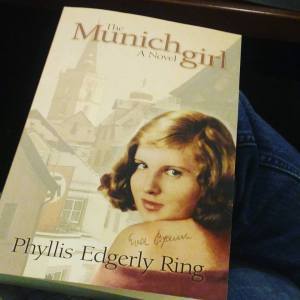
Far from attempting to redeem her, however, The Munich Girl follows along patterns of how Braun’s life in Hitler’s shadow, which ended alongside him when she was 33, is emblematic of what many women have done, and still do, in a world still hobbled by inequality. Unable to enact their own potential in a direct way, they resort to doing so from the invisible sidelines and background.
In Eva Braun’s case, that public invisibility lasted the entire 16 years she spent with Hitler. 
As one reader puts it: “Women, even well-educated women such as [Anna], the novel’s protagonist, are groomed to give up their lives for the ‘larger’ missions of their husbands and lovers. … one of the many ways in which the feminine aspect of humanity is subjugated, Fascism being the most extreme form.”
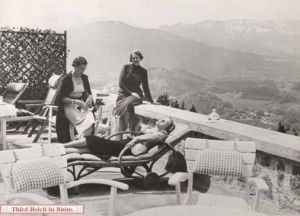 The story of The Munich Girl is about many things beyond Eva Braun and the time of the war in Germany. It’s about how women share our lives with each other, the power of our friendships, and the way we protect each other’s vulnerabilities, perhaps as part of how we begin to gain compassion.
The story of The Munich Girl is about many things beyond Eva Braun and the time of the war in Germany. It’s about how women share our lives with each other, the power of our friendships, and the way we protect each other’s vulnerabilities, perhaps as part of how we begin to gain compassion.
So that our world can, too.
Find more about The Munich Girl at:
https://www.amazon.com/Munich-Girl-Novel-Legacies-Outlast-ebook/dp/B01AC4FHI8/


September 26, 2016
All that an “ordinary” Munich girl reveals
 When I reconnected with Germany as an adult after living there in the early 1960s, I wanted to understand more about that nation’s experience during WWII.
When I reconnected with Germany as an adult after living there in the early 1960s, I wanted to understand more about that nation’s experience during WWII.
Almost immediately afterward, I was given a biography about Hitler’s mistress – later wife — Eva Braun, written by British-German writer Angela Lambert.
I knew I needed to read more about Hitler and the Third Reich in order to understand more about Germany and the war. Eva Braun seemed a likely place to start.

Hotel Schwann, Wertheim, my family’s first home in Germany, and a favorite stop of mine still.
I just never expected how close that would bring me to Hitler’s living room.
While she’s a main character, Braun is not the novel’s protagonist. (That’s Anna, born just as the war came to an end in Germany.)
But Braun’s 33-year life provides a metaphorical motif for exploring the effects of self-suppression in many lives, especially those of women.
For research, I immersed in reading about her life, and the time period (120+ books), and that “inner circle” that Braun moved within as part of Hitler’s life. I spent hours watching the films she had made, and looking at many of her photographs.
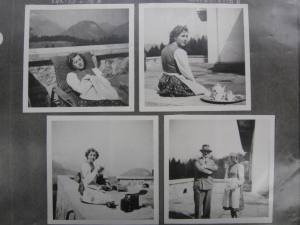 Eventually, I made two trips to the National Archives here in the U.S., where photo albums of hers that were confiscated by the Allies after the war have been stored ever since. Looking at those probably provided my closest sense of connection with her life, and with her as a “character.” As with most of my research, I was looking to read between the lines of what was known to be factual. I was looking for more of the emotional story that her life showed, that the pieces of her experience pointed to.
Eventually, I made two trips to the National Archives here in the U.S., where photo albums of hers that were confiscated by the Allies after the war have been stored ever since. Looking at those probably provided my closest sense of connection with her life, and with her as a “character.” As with most of my research, I was looking to read between the lines of what was known to be factual. I was looking for more of the emotional story that her life showed, that the pieces of her experience pointed to.
Among the discoveries my research turned up is the little-known (or infrequently shared) information from testimony given at the Nuremberg Trials that shows how an action she took in the last week of her life saved tens of thousands of Allied prisoners of war. She likely did this to protect Hitler’s reputation – he was going to have them all killed. Among those who were saved were British members of my own family. That discovery stunned me when I unearthed it, and was definitely a turning point for me, as a novelist. 
While she is famous because of someone infamous, Eva Braun came from what would be perceived both then and now as an extremely “ordinary” life. Lambert’s biography revealed how much of what was believed about Braun was inaccurate, right down to frequent misidentification of her in photos.
Lots of assumptions and judgments about her have masked key information that her life could provide about Hitler. Paradoxically, although much of what has been conveyed about her was based on presumed understanding about him, it’s a more complete picture of her that can provide the most accurate view of Hitler. 
She loved him, I have no doubt. Yet, in many ways, she gave up both her sense of self and of self-determination to “prove” that love, show her loyalty. (Loyalty was very important to Hitler, who trusted so poorly, if at all. But he trusted her.) I think the distorted self-denial she showed is still cultivated in collective culture today in ways designed to keep inequality in place. Many, especially women, give up the freedom of their own wholeness for the sake of proving love, and loyalty. I think the false value this behavior is given is a big part of what allows oppression and repression to continue, along with the imbalance of power that always accompanies them.
I suppose it’s natural that people might assume this novel aims to exonerate or redeem Eva Braun, but that’s never been its goal. She came to represent, for me, the many things that we can form conclusions about without ever delving deep enough to uncover the whole story, in order to genuinely find truth.
If the story aims to convey any sort of message, it’s that no human being is all good or all bad, and human circumstances are always more complex than they appear. If we’re not willing to accept and understand this, we’re unlikely to learn from history. 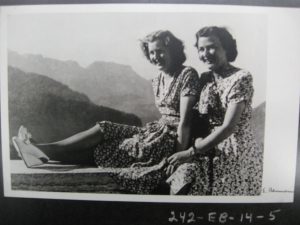
This is also a story about outlasting the chaos and confusion of war and other kinds of violence and destruction by valuing — and protecting – all of the good that we are willing to build together in our world. Many Germans did this, though until recently, their stories have remained unknown.
The novel is also about the eventual homecoming we must all make to our truest self, and the role that others often mysteriously play in that process.
Find more about The Munich Girl at:
https://www.amazon.com/Munich-Girl-Novel-Legacies-Outlast/dp/0996546987/


September 21, 2016
What are the legacies that outlast war?
 My novel, The Munich Girl, is about many things, including a secret friendship between two women, one of whom was Hitler’s mistress, and later wife, Eva Braun.
My novel, The Munich Girl, is about many things, including a secret friendship between two women, one of whom was Hitler’s mistress, and later wife, Eva Braun.
But its themes are really about two realities that matter a great deal to my heart.
The first is the experience of reunion with and “coming home to” our truest self that we all must eventually encounter in our life. We each have our own timetable for this, but my opportunity to accompany many people toward the end of their lives has assured me that this is so. That privilege also allowed me to see that the benefits of achieving this inner reunion always extend far beyond our own small selves. 
The novel’s second and particularly fascinating theme, for me, is the mysterious role that others play in the process of how our inner reunion occurs, often in highly unexpected ways.
As a child in Germany, and when I returned to visit as an adult, I heard little about the years of the Second World War — mostly just “thank God it’s behind us.”
Yet, similar to characters in the story, some of the kindest, most morally courageous people I knew were those Germans who never wanted the war, or National Socialism, and found creative ways to outlast it and to help others as they did. 
They found the way to endure, not lose heart, and keep faith and hope in times of enormous destruction and suffering.
And, they made meaningful choices wherever they could, mostly on behalf of others, more than themselves.
I believe that the example in their lives applies more than ever in our world, and that we’ve barely tapped into the spiritual gifts and lessons they offer. 
As Elizabeth Sims, novelist and contributing editor at Writer’s Digest noted in her kind comments about the novel:
“Love can manifest itself in enigmatic—and unexpected—ways.”
And, as one character in the novel observes:
“Sometimes, we must outlast even what seems worse than we have imagined, because we believe in the things that are good.
So that there can be good things again.”
Find more about The Munich Girl: A Novel of The Legacies That Outlast War at:


September 9, 2016
Life, love — and a little Hitler
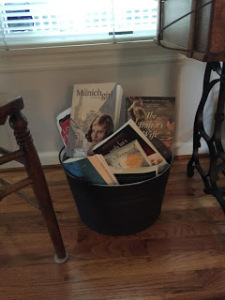
Photo: Courtesy Silver’s Reviews / http://silversolara.blogspot.com/2016/08/the-munich-girl-by-phyllis-edgerly-ring.html
A growing number of book reviewers and bloggers have been giving The Munich Girl their reading time lately, bless them.
“I didn’t think I would like this book when I read what it was about,” reader Marie Duess writes in her review at Amazon. “And I will admit that I felt somewhat uncomfortable while reading it from time to time because I was actually fascinated with it and enjoying it–but how could I? It was about Adolf Hitler’s mistress/wife. Aren’t we supposed to hate her? Hate all things Hitler?”
Marie echoes what a number of readers surely experience when faced with the prospect of a book about Hitler’s mistress, and eventual wife, Eva Braun. 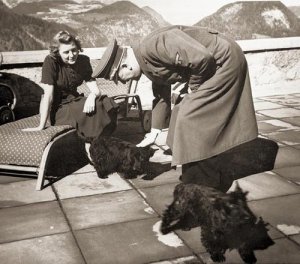
“I believe that this book will be one of my more controversial book reviews; not because of the rating, but simply because of the fact it deals with Eva Braun, yes, the wife of that German swine,” writes reviewer and book blogger Svetlana at her Svetlana’s Reads and Views blog. “I was a bit nervous beginning to read the book because I wasn’t sure how that German swine would be portrayed; would he be portrayed in a way that would make me upset, or would he be portrayed in a way that is accurate? ” She notes that to her relief, this isn’t his story at all, but focuses on the lives of its three women, and also “why and how women give themselves up for men’s ambitions.”
Reviewer Chris Lovegrove picked up on this, too, along with something few reviewers have mentioned yet — the fact that the novel “revolves around symbols which underscore the significances that humans attach to life events. There is Eva’s monogram of an intertwined E and B resembling both a butterfly and a vierblättriges Kleeblatt or four leaf clover; the latter’s often regarded as emblematic of faith, hope, love and luck, the former a symbol of metamorphosis.
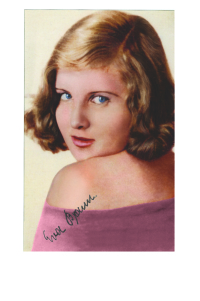 “Then there is the poorly executed portrait of Eva by an admirer, a painting that has been in Anna’s mother’s possession since the war. Photographs recur over and over as vital links with past lives (they also punctuate the text); fire appears as if a kind of baptism to a new life; and dreams form another leitmotif, seeming to blend the past and future as dreams so often do.”
“Then there is the poorly executed portrait of Eva by an admirer, a painting that has been in Anna’s mother’s possession since the war. Photographs recur over and over as vital links with past lives (they also punctuate the text); fire appears as if a kind of baptism to a new life; and dreams form another leitmotif, seeming to blend the past and future as dreams so often do.”
Chris Lovegrove’s review goes straight to the book’s heart in so many ways, including that “essentially though this novel is about love; and it’s also about coming home. And of course sometimes the two can be the same thing.”
Find his insightful review at:
https://calmgrove.wordpress.com/2016/08/31/munich
and Svetlana’s good thoughts about the book at:
http://sveta-randomblog.blogspot.com/2016/09/g740-book-review-of-munich-girl-by.html


September 6, 2016
The cup is … refillable

Georges De Feure, “Ferme au bord du Zuiderzee, 1910.
Our journey is about being more deeply involved in life and less attached to it.
~ Ram Dass
 Whatever happens to you, don’t fall in despair.
Whatever happens to you, don’t fall in despair.
Even if all the doors are closed, a secret path will be there for you that no one knows.
You can’t see it yet but so many paradises are at the end of this path.
Be grateful! It is easy to thank after obtaining what you want, thank before having what you want.
~ Shams Tabrizi


August 25, 2016
Just an ordinary Munich girl
What led me to write a book about Hitler’s mistress (and eventual wife), Eva Braun?
It reminds me of what so many asked after the war, after her death, when the role she had played finally came to light:
“Why her, just an ordinary Munich girl?”
I had a chance to ponder these questions again during this summer’s conference of the International Women’s Writing Guild at Muhlenberg College in Pennsylvania. The IWWG is a wonderful network that fosters the personal and professional empowerment of women through writing. 
An extra treat there this year (and there were many) was hearing CBS Sunday Morning contributor Nancy Giles as keynote speaker. Her blend of insight and humor lingers and encourages me, still. It was right in line with IWWG’s focus on the development of our “inner ability to perceive the subtle interconnections between people, events, and emotions”. If you’re a woman and a writer, check out: http://www.iwwg.org.
In a wonderful memoir workshop led by author Maureen Murdock, I had a chance to ponder some of those “subtle interconnections” as I reflected again on that Eva Braun question. In one workshop activity, I wrote: “What a paradox that she often spoke very directly to — even scolded — her tyrant of a lover, yet also ceded her entire life to him. 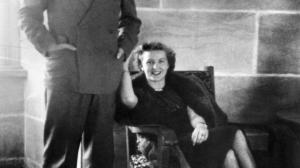
“Who knows which of her unnamed roles was really the more significant, in her time? The buffer she sometimes provided for others around him? The diffuser of tension she so often was, or the soother of circumstances that others undoubtedly came to rely on during the self-will-run-riot mania of a self-appointed despot?
“She seems such an emblem of what so many women do, have done, throughout the ages. Not able to enact their own potential in a direct and visible way, they must resort to doing so from the invisible sidelines and background.”
In Eva Braun’s case, that invisibility lasted the entire 16 years she spent with Hitler.
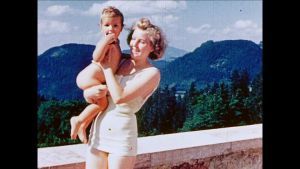 Ironically, because she was considered so insignificant, she was allowed to film the visual evidence that proved — though he publicly protested to the contrary — that the Führer did, indeed, have a private life.
Ironically, because she was considered so insignificant, she was allowed to film the visual evidence that proved — though he publicly protested to the contrary — that the Führer did, indeed, have a private life.
One he never would have had without her.
A question that still lingers for me is, did she?
Find more about The Munich Girl: A Novel of the Legacies That Outlast War here:
http://www.amazon.com/Munich-Girl-Novel-Legacies-Outlast/dp/0996546987/


August 21, 2016
Goodreads Giveaway for The Munich Girl
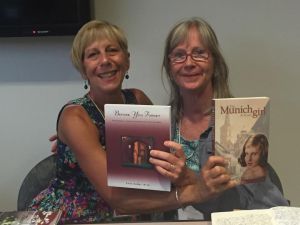
With fellow author, Kelly DuMar at the annual summer conference of the International Women’s Writing Guild.
Enter to win — Goodreads Giveaway:
About the book: The Munich Girl
About the author: Phyllis Edgerly Ring
Runs August 22 through September 14.




